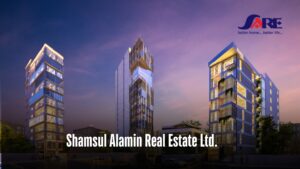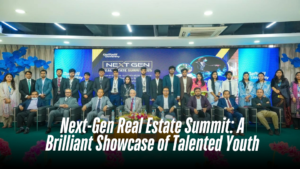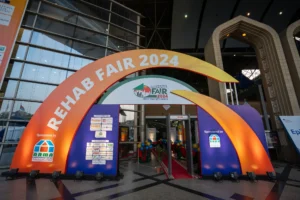Real Estate

A Legacy Written in Brick and Trust
In 1992, when Dhaka’s middle class was just beginning to dream beyond modest apartments, a quiet vision began to take root. It was not about towers or market share but something simpler: “We stand for more than just buildings. We stand for trust, quality, and long-term relationships,” said Wasif Shamsul Alamin, Executive Director of Shamsul Alamin Group. That ethos, inherited from his grandfather, has since grown into one of Bangladesh’s most enduring real estate legacies. From its official founding in 2003, Shamsul Alamin Real Estate Ltd. built its reputation project by project, with a principle as straightforward as it was profound—do what you promise. “Our reputation wasn’t built on advertising slogans; it was built on living up to our core principles of trust and quality, project after project,” Wasif explained. Today, with more than 50 completed projects across Dhaka, the company’s presence stretches from Gulshan and Banani to Uttara, carrying forward a legacy of care, not just construction. Resilience in a Changing Market The journey has not been without challenges. Financing remains a major obstacle, as higher bank rates strain both buyers and developers. Rising costs of steel, cement, and land add further pressure. Yet the company continues to innovate, exploring modern methods like steel-frame construction and embedding sustainability features such as rainwater harvesting and energy-efficient materials. “We’re not driven by volume or profit. We’re driven by purpose—to create high-standard, thoughtfully designed living spaces,” Wasif said, underscoring how the firm positions itself in a market projected to reach $3.53 trillion by 2028. Living Spaces with Soul In Baridhara’s diplomatic enclave, the company’s philosophy finds expression in Alamin Tonmoy, a residential project that feels more like a sanctuary than a structure. With its lush greenery and private, one-apartment-per-floor design. Tonmoy embodies what Wasif describes as “homes, not just properties”—spaces where life breathes and privacy thrives. Back in Gulshan 1, Alamin Angur offers another lens into the company’s vision. Its three-bedroom residences reflect tranquillity and family living, designed for those who value both space and community. Angur demonstrates the company’s sensitivity to everyday life in Dhaka, marrying functionality with understated elegance. Workspaces for a Modern City If Tonmoy and Angur show the company’s care for private living, its commercial ventures display equal attention to the rhythm of modern business. In Banani, A&A Alamin Business Bay reimagines what a workspace can be. With thermal glass façades and wellness- oriented design, it is less about corporate square footage and more about creating an environment where businesses flourish holistically. At Kakrail, Alamin Capital Square rises with quiet confidence. Its design balances aesthetics with longevity, providing corporate tenants not only modern facilities but also a sense of permanence. From prayer spaces to community floors, the tower reflects a corporate philosophy grounded in dignity and practicality. Further north, in Uttara, Plaza 15 stands as a landmark of accessibility and commerce. Along the wide Gareeb-E- Newaz Avenue, the development’s positioning makes it a hub where business meets community. Its scale and convenience are matched by a forward-looking approach to safety, offering Dhaka’s new commercial class both ambition and assurance. Problems that Demand Solutions Yet behind this skyline of promise lies a sector grappling with deep-rooted problems. Financing remains perhaps the most pressing. As Wasif explained, interest rates on home loans now hover between 9 and 18 percent, making mortgages unaffordable for many aspiring homeowners. Developers, too, feel the squeeze as project financing grows increasingly expensive. “We saw the positive impact when government pushed for single-digit housing loans,” he recalled. “Those initiatives truly stimulated demand. To keep this growth going, we need a similar approach.” Land scarcity in Dhaka adds another layer of complexity. Prices continue to soar, putting pressure on companies committed to affordability. Add to this the volatile costs of raw materials—cement, steel, glass—and the challenge of offering high-quality housing at reasonable prices becomes all the more daunting. For firms like Shamsul Alamin Real Estate, the task is not only to build but to do so within constraints that demand creativity and resilience. A Sector of Immense Potential Still, the potential of the sector is undeniable. With rapid urbanisation and a rising middle class, demand for housing remains resilient—even in the wake of global disruptions like COVID-19. Over the past 15 years, Bangladesh’s real estate market has witnessed remarkable growth, now valued at $2.68 trillion and projected to expand to $3.53 trillion by 2028. “Urbanisation and rising incomes are driving huge demand for homes. The numbers speak for themselves,” Wasif observed, framing real estate as not just an economic driver but a reflection of the nation’s transformation. Charting a Way Forward The solutions, according to Wasif, must come from both industry and policy. Innovation in design and construction can help lower costs and speed up delivery. Techniques like steel-frame building, once an experiment, are now becoming viable tools for efficiency. Sustainable features—energy-saving materials, green spaces, rainwater harvesting—are being embedded not just for environmental reasons, but because they reduce long- term living costs for homeowners. Policy, too, must evolve. Affordable, long-term mortgage schemes would unlock home ownership for middle-income families, while easier access to credit for developers could keep projects moving forward. Collaboration between state and private sector, Wasif argued, is the key to ensuring that the housing dream remains within reach for millions of Bangladeshis. Building More than Structures For Wasif, the mission is deeply personal. “Working in this company means being part of something bigger than just business—it’s about contributing to a legacy of honesty, care, and creating lasting value in people’s lives,” he said. In his words, real estate is not about concrete alone—it is about the dreams of families, the pride of ownership, and the future of a city that is still writing its skyline. Shamsul Alamin Real Estate
Read More
Next-Gen Real Estate Summit: A Brilliant Showcase of Talented Youth
To discuss the development and future prospects of the real estate sector, the Department of Real Estate, Daffodil International University organized the “Next Gen Real Estate Summit 2025”. This grand summit took place on February 23 and 24 at the Ashulia campus of Daffodil International University, where key figures from various government and private organizations were present. Representatives from BUET, RAJUK, House Building Finance Corporation, REHAB, the National Housing Authority (NHA), and various other industrial institutions participated in the event. The two-day summit featured formal sessions, cultural programs, and a Mezban feast. The formal session was held at the International Conference Hall of Daffodil International University, where expert speakers discussed the future development of the real estate industry and the importance of sustainable housing. The panel discussion was attended by Professor S. M. Mahbub Ul Haq Majumder, Pro Vice-Chancellor, Daffodil International University; Professor Mustafa Kamal, Dean of Academic Affairs; Professor Mohammad Masum Iqbal, Dean of the Faculty of Business & Entrepreneurship; M. Mahbubur Rahman, CEO of Rupayan City Uttara; Md. Mobarak Hossain, Director, REHAB; Kamrul Hasan, Deputy Town Planner, RAJUK; and Md. Golam Mostafa, Deputy General Manager and Chief Engineer, House Building Finance Corporation. The welcome speech at the conference was delivered by Dr. Amir Ahmed, Head of the Real Estate Department at Daffodil International University. A lively cultural event took place at the Student Lounge and the Independence Conference Center, while the Mezban feast was held at Golap Gram. One of the main attractions of the summit was the Poster Presentation Competition. The theme of the competition focused on innovative ideas in the real estate and housing sector, which are expected to play a crucial role in improving future living standards. A total of 10 teams from Dhaka University, CUET, Khulna University, Jahangirnagar University, KUET, and Daffodil International University participated in this competitive event. Each team consisted of two members from the Urban Planning, Architecture, Civil Engineering, and Real Estate departments of their respective universities. Participants presented their research-based ideas, designs, and plans for the future development of the real estate sector. At the end of the competition, the judges selected the top three teams as winners. The judging panel consisted of Nizam Ahmed, Major General (Retd.), Engineer Mujahid Monir, Major (Retd.), and Anwar Haque, Senior Journalist and Brand Communication & Corporate Head of Pa-Wang Ceramics. The first-place winners were jointly Mirajul Islam Alif and Tasnuha Pasha Tonu from Daffodil International University, and Abrar Muhtasim Pathan and Souda Samiha from Khulna University. The second-place winners were Fauzan Anowar and Fathan Anowar from Daffodil International University. The third-place winners were Minhazur Rahman Shafin and Hamim Mubtasim from Dhaka University. At the award ceremony, the distinguished guests highly praised the participants’ innovative ideas and creativity, wishing them success in their future research and development efforts in the housing sector. Dr. Amir Ahmed, Head of the Real Estate Department at Daffodil International University, stated that competitions like this inspire students to engage in new ideas and research. He added that the application of technology and innovative concepts in the real estate industry will play a vital role in the future development of housing systems. The “Next Gen Real Estate Summit 2025” was not just a conference; it served as an open platform for discussions on the role of technology in future urban planning and the real estate sector. Experts believe that student participation, research, and innovative presentations will open new horizons for the development of the real estate industry. Written by Anonno Aziz Nibir
Read More
REHAB Fair 2024 Concludes with Overwhelming Turnout and Promising Prospects
The five-day REHAB Fair 2024, organized by the Real Estate & Housing Association of Bangladesh (REHAB), concluded on December 27 at the Bangabandhu International Conference Centre (BICC) with remarkable success. Drawing 17,729 visitors, the event showcased the growing potential of the real estate sector, featuring stakeholders such as land developers, builders, financial institutions, and ceramic companies. RAJUK Chairman Siddiqur Rahman Sarkar inaugurated the fair on December 23. REHAB reported sales and bookings worth Tk 403.13 crore, comprising flats (Tk 230 crore), plots (Tk 96 crore), and commercial spaces (Tk 77.12 crore). Additionally, banks committed approximately Tk 1,090 crore in loans. Prominent real estate companies like Sheltech and Mir Real Estate used the platform to showcase new projects and connect with clients. “The fair helps us engage with old and new customers while facilitating direct comparisons across companies,” noted Sheltech’s Deputy GM, AKM Rafiul Islam. The fair also highlighted the ceramic industry’s growing influence in real estate. REHAB President Md. Wahiduzzaman emphasized that ceramics now constitute a significant part of a building’s finishing phase, accounting for 60% of total construction. Ceramic companies had a strong presence, showcasing high-quality tiles and tableware, which are increasingly in demand. The fair committee chairman, Mohammed Akter Biswas, underscored the industry’s impact, with 12-15% of the GDP linked to real estate and related industries like rod, cement, and tiles. He praised the fair’s role in uniting buyers and sellers, offering customers the chance to explore a wide range of products and services under one roof. REHAB leaders expressed optimism about the sector’s recovery by 2025, contingent on supportive government policies addressing challenges like high registration costs, VAT, and the economic slowdown. The event’s success reinforces its importance in fostering growth and innovation in Bangladesh’s real estate industry.
Read More
